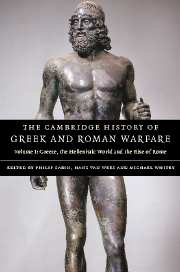Book contents
- Frontmatter
- Introduction: The Historiography of Ancient Warfare
- Part I Archaic and Classical Greece
- 4 International relations
- 5 Military forces
- 6 War
- 7 Battle
- 8 Warfare and the state
- 9 War and society
- Part II The Hellenistic World and the Roman Republic
- Chronological Table
- Glossary
- List of Ancient Authors
- Bibliography
- Index of ancient passages cited
- General index
- Map 1 The western Mediterranean
- Map 3 The Near East
- References
7 - Battle
from Part I - Archaic and Classical Greece
Published online by Cambridge University Press: 28 March 2008
- Frontmatter
- Introduction: The Historiography of Ancient Warfare
- Part I Archaic and Classical Greece
- 4 International relations
- 5 Military forces
- 6 War
- 7 Battle
- 8 Warfare and the state
- 9 War and society
- Part II The Hellenistic World and the Roman Republic
- Chronological Table
- Glossary
- List of Ancient Authors
- Bibliography
- Index of ancient passages cited
- General index
- Map 1 The western Mediterranean
- Map 3 The Near East
- References
Summary
LAND BATTLES
introduction: defining the battlefield of debate
From a traditional perspective Greek warfare suffered two ‘revolutions’: first, in the seventh century the emergence of heavy infantry in a dense formation (phalanx) coincided with the birth of the polis and demarcated the archaic period from the Dark Age warfare of Homeric epic, featuring fluid battles of a few heroes. A stringent unwritten code of warrior ethics and limited warfare came to govern operations within an in-group of major Greek poleis, and the expansion of the warrior function to all citizens capable of equipping themselves democratized warfare without abandoning completely the aristocratic ethos of Homeric heroes.
The seeds of a second ‘revolution’ sprouted in the early fifth century. Conflicts with ‘outsiders’ (the Persian Wars, 490, 480–479) vindicated Greek belief in heavy infantry’s superiority to mobile combat with the bow, cavalry and light infantry, but awakened both the concept of strategy, when faced with opponents not recognizing the Greek rules of the game, and the realization of the limited defensive resources of individual poleis vis-à-vis wealthier, numerically superior ‘outside’ powers. A horizon, accented by the length and horrors of the Peloponnesian War (431–404), had been crossed. Gazing over this divide, fourth-century and later writers (e.g. Isocrates, Demosthenes, Ephorus and Polybius) could romanticize ‘the good old days’ of the archaic period as a time of civilized warfare by an accepted code of behaviour.
Keywords
- Type
- Chapter
- Information
- The Cambridge History of Greek and Roman Warfare , pp. 186 - 247Publisher: Cambridge University PressPrint publication year: 2007
References
- 9
- Cited by

